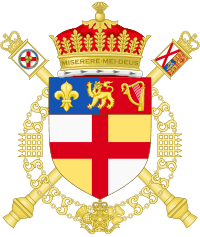Burke's Peerage
Burke's Peerage Limited is a British genealogical publisher founded in 1826, when Irish genealogist John Burke began releasing books devoted to the ancestry and heraldry of the peerage, baronetage, knightage and landed gentry of the United Kingdom. His first publication, a Genealogical and Heraldic Dictionary of the Peerage and Baronetage of the United Kingdom, was updated sporadically until 1847, when the company began releasing new editions every year as Burke's Peerage, Baronetage and Knightage (often shortened to just Burke's Peerage).
 | |
| Private limited company | |
| Industry | Publishing |
| Predecessor | Burke's Peerage (1826) Limited (2013–2016) |
| Founded | 1826 in London, England |
| Founder | John Burke |
| Headquarters | , England |
| Website | burkespeerage |
Other books followed, including Burke's Landed Gentry, Burke's Colonial Gentry, and Burke's General Armory. In addition to the peerage, Burke's published books on royal families of Europe and Latin America, ruling families of Africa and the Middle East, distinguished families of the United States and historical families of Ireland.
History
The firm was established in 1826 by John Burke (1786–1848), progenitor of a dynasty of genealogists and heralds. His son Sir John Bernard Burke (1814–92) was Ulster King of Arms (1853–92) and his grandson, Sir Henry Farnham Burke (1859–1930), was Garter Principal King of Arms (1919–30). After his death, ownership passed through a variety of people.
%2C_Title_Page.jpg)
Apart from the Burke family, editors have included Arthur Charles Fox-Davies, Alfred Trego Butler, Leslie Gilbert Pine, Peter Townend, and Hugh Montgomery-Massingberd.
Criticism
In 1877, the Oxford professor Edward Augustus Freeman attacked the accuracy of Burke’s [1] and claimed that it contained pedigrees that were "purely mythical – if indeed mythical is not too respectable a name for what must be in many cases the work of deliberate invention …. (and) all but invariably false. As a rule, it is not only false, but impossible … not merely fictions, but exactly that kind of fiction which is, in its beginning, deliberate and interested falsehood."[2] Oscar Wilde in the play A Woman of No Importance wrote: "You should study the Peerage, Gerald. It is the one book a young man about town should know thoroughly, and it is the best thing in fiction the English have ever done!" In 1901, the historian J. Horace Round wrote of Burke’s “old fables” and “grotesquely impossible tales”.[1]
More recent editions have been more scrupulously checked and rewritten for accuracy, notably under the chief editorship, from 1949-59, of L. G. Pine- who was very sceptical regarding many families' claims to antiquity: ('If everybody who claims to have come over with the Conqueror were right, William must have landed with 200,000 men-at-arms instead of about 12,000')-[3] and Hugh Massingberd (1971-83).[4]
See also
- Almanach de Gotha
- Burke’s Landed Gentry
- Debrett's Peerage & Baronetage
- Libro d'Oro
- Carnet Mondain
- European royalty
- Hereditary peers
- Life Peers
- Baronets
- International Register of Arms, formerly Burke's Peerage & Gentry International Register of Arms

References
- Round, J. Horace (1901), Studies in Peerage and Family History, London, ISBN 0-8063-0426-X, retrieved 25 March 2018
- Freeman, Edward A. (June 1877), "Pedigrees and Pedigree-Makers", Contemporary Review, XXX, pp. 11 to 41
- Time magazine, 'Twentieth Century Squires', 10 Dec 1951
- Burke's Landed Gentry 18th Edition (1972), editorial preface, Hugh Montgomery-Massingberd
External links
- Burke's Peerage website
- Burke's Peerage Foundation website
- College of Arms website
- Lyon Court website
- Standing Council of the Baronetage website
Online editions
- 1st edition - 1826 - Hathitrust
- 3rd edition - 1830 - Hathitrust
- 4th edition - 1832 - Vol 1 - Hathitrust
- 4th edition - 1832 - Vol 2 - Hathitrust
- 4th edition - 1832 - Vol 2 - Google Books
- 4th edition - corrected to 1833 - Vol 2 - Hathitrust
- 5th edition - 1838 - Google Books
- 6th edition - 1839 - Hathitrust
- 7th edition - 1843 - Vol 2 - Hathitrust
- 10th edition - 1848 - Hathitrust
- 12th edition - 1850 - Hathitrust
- 20th edition - 1858 - Hathitrust
- 22nd edition - 1860 - Hathitrust
- 23rd edition - 1861 - Hathitrust
- 27th edition - 1865 - Google Books
- 30th edition - 1868 - Google Books
- 30th edition - 1868 - Vol 1 - Hathitrust
- 30th edition - 1868 - Vol 2 - Hathitrust
- 31st edition - 1869 - Vol 1 - Hathitrust
- 31st edition - 1869 - Vol 2 - Hathitrust
- 37th edition - 1875 - Vol 2 - Hathitrust
- 40th edition - 1878 - Hathitrust
- 48th edition - 1886 - University of Dusseldorf
- 53rd edition - 1891 - University of Dusseldorf
- 76th edition - 1914 (to page 1274) - Archive.org
- 99th edition - 1949 - Archive.org
- 102nd edition - 1959 - Hathitrust